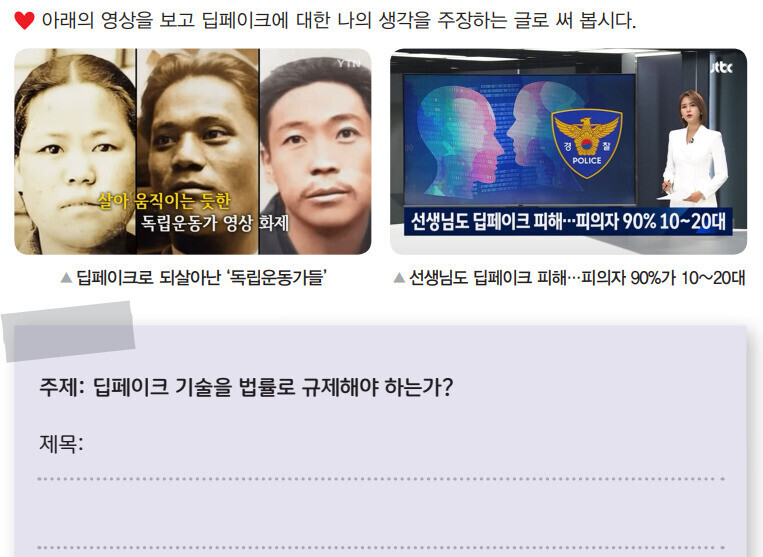
Teaching materials for elementary school students were released last year by the Korea Information Society Development Institute. The text asks students to watch two videos about deepfakes—one about how to “bring back to life” independence movement heroes using deepfake technology, and the other about deepfakes targeting teachers—before writing whether they think deepfake technology should be regulated by law. (from KISDI)
“Should we take advantage of the strengths of deepfake technology? Or is it a technology we should simply avoid using? Discuss this with your partner.”
An AI ethics textbook for middle schools, published last year by the Korea Information Society Development Institute (KISDI), encouraged students to debate the merits of using deepfake technology, explaining that while it can be useful in fields such as the film industry, it can also be misused to commit crimes.
But the manual does not mention the damages or penalties incurred when AI is used for criminal purposes.
As revelations show that the majority of victims and perpetrators of recent sex crimes involving AI-powered deepfakes are minors, observers stress the need for more sophisticated ethical education for young people who are already fluent in AI technology.
A review Wednesday of a National Youth Policy Institute research report titled “How to Cultivate Young Digital Minds” showed that even young people stressed the importance of their peer group receiving education on AI ethics.
A middle school student who participated in an in-depth interview explained, “There was a brief segment on deepfake crime prevention, but I wish they would raise more awareness among students that this is a serious issue.”
Kim Myuhng-joo, a professor of information security studies at Seoul Women’s University, observed that South Korea “is currently facing the consequences of inadequate ethics education.”
Even schools that have offered courses on AI ethics have limited themselves to asking questions like “What would be the right response to the circulation of fake videos showing a politician surrendering in wartime?” and asking students to share their own thoughts or discuss the issue.
“We need to clearly inform students about the consequences of violating social rules and the measures that students who are harmed in such cases can take,” said Lee Cheong-hyeon, 34, who teaches information science at a high school in Bucheon, Gyeonggi Province.
Parents and youth education organizations argue that gender and sexuality education, which has been cut back since the current administration came to power, must be expanded to fundamentally combat the pervasive culture of misogyny.
A press conference was held by a coalition of parent groups calling for global action to end deepfake sex crimes outside the Seoul government complex on Wednesday.
“The Ministry of Education has removed the terms ‘sexual and gender minorities,’ ‘gender equality,’ and ‘sexuality,’ among others, from its updated 2022 curriculum, and the Ministry of Gender Equality and Family has cut the budget for sex and human rights education programs to zero,” said Yeo Mi-ae of the Seoul chapter of Parents for Equality Education.
“It is no coincidence that this broad culture and norms of sexual exploitation persist from generation to generation,” she said.
At another press conference held by 32 education advocacy groups that day outside the National Assembly, those gathered called for “strengthening comprehensive sex education from a gender-sensitive perspective, not in some, but in all schools” in Korea.
By Ko Na-rin, journalist
Please direct any questions or comments to (english@hani.co.kr)


